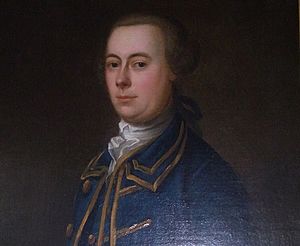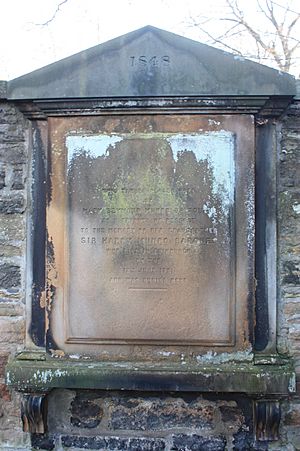Sir Harry Munro, 7th Baronet facts for kids
Quick facts for kids
Sir Harry Munro, 7th Baronet
|
|
|---|---|
 |
|
| Born | 1720 |
| Died | 1781 Edinburgh |
| Allegiance | British |
| Rank | Captain |
| Unit | Loudon's Highlanders |
| Battles/wars | Battle of Prestonpans Skirmish of Tongue |
| Relations | Sir Robert Munro, 5th Baronet (grandfather) Sir Robert Munro, 6th Baronet (father) George Munro, 1st of Culcairn (uncle) Sir Hugh Munro, 8th Baronet (son) |
| Other work | Member of Parliament |
Sir Harry Munro, 7th Baronet (born around 1720 – died 12 June 1781) was an important Scottish leader. He was the 25th Baron and the 28th chief of the Clan Munro. Harry was a brave soldier and a smart politician. He was loyal to the Hanoverian royal family. He served as a captain in a special army group called Loudon's Highlanders from 1745 to 1748.
Contents
Becoming a Soldier
Early Life and Family
Harry Munro was the second son of Sir Robert Munro, 6th Baronet. His mother was Mary Seymour. Sadly, his older brother Robert passed away when he was very young. Harry's uncle was George Munro, 1st of Culcairn.
Joining the Army
Harry's military journey began in May 1742. He became an Ensign in Bisset's 30th Regiment of Foot. An Ensign was a junior officer who carried the flag. In June 1745, he was chosen to lead a company. This was for a new Highland Regiment. It was being formed by John Campbell, 4th Earl of Loudoun.
Fighting in the Jacobite Rising
Joining General Cope
In 1745, a big rebellion started in Scotland. It was called the Jacobite Rising. Harry Munro's company was still being formed. The army commander, General Sir John Cope, arrived in Inverness. Harry's uncle, George Munro, promised that the Munros would join the King's troops. The next day, Harry brought 200 of his men. These men formed three companies.
Harry joined General Cope's army. They marched towards Aberdeen. Harry's three companies were part of Loudon's Highlanders. His uncle's men acted as scouts.
The Battle of Prestonpans
General Cope's army sailed to Dunbar. There, they faced a big defeat at the Battle of Prestonpans. Harry was one of 70 officers captured. He was held prisoner in Glamis Castle. By January 1746, he was released. He learned sad news in Edinburgh. His father, Robert, and his uncle Duncan had died. They passed away after the Battle of Falkirk (1746).
Meanwhile, most of the Munro fighters had returned north. They were not at Prestonpans.
Fighting in the North
After Prestonpans, Lord Loudoun returned north. He took command in Inverness. But a larger Jacobite force pushed him back. He had to retreat into Ross-shire.
The main British commander, Prince William, Duke of Cumberland, did not trust Highland troops. He gave no help to Lord Loudoun. Harry Munro, however, continued to fight. In March 1746, he was with George Mackay of Skibo. They fought at the Skirmish of Tongue. They won against a Jacobite force. They also captured money and supplies. These were meant for the Jacobite leader, Charles Edward Stuart.
Other companies of Loudoun's regiment fought at the Battle of Culloden. But Harry Munro was not there. He was given leave to deal with problems at Foulis Castle. The castle had been burned after the Battle of Falkirk.
After the rebellion ended, Loudoun's Highlanders helped with cleanup operations. They were based at Fort Augustus. The regiment later went to Flanders to join the army there. Harry's company seemed to stay in Scotland. The regiment was later disbanded in June 1748.
A Career in Politics
Serving in Parliament
Harry Munro was a strong supporter of the Duke of Newcastle. The Duke was a leading Whig politician. He served as Prime Minister for several years.
Harry Munro also became a Member of Parliament (MP). He represented Ross-shire from 1746 to 1747. Then he represented Tain Burghs from 1747 to 1761. An MP helps make laws for the country.
Family Life
Harry married Anne. She was the daughter of Hugh Rose of Kilravock. Hugh Rose was the chief of the Clan Rose. Harry and Anne had a son named Sir Hugh Munro, 8th Baronet. Hugh later became the 8th Baronet of Foulis.
Sir Harry Munro is buried in Greyfriars Kirkyard. This is a famous graveyard in Edinburgh.
Independent Highland Companies
Lord Loudoun raised special Highland Companies in 1745-46. These were different from other Independent Highland Companies raised by Duncan Forbes of Culloden. Records show lists of soldiers who served under Sir Harry Munro. These lists are kept in the Huntington Library in California. They show how his three companies were reduced to just one after the Jacobite Rising ended.
Images for kids
See also
- Munro Baronets
- Clan Munro
- Scottish clan
| Parliament of Great Britain (1707–1800) | ||
|---|---|---|
| Preceded by Charles Ross |
Member of Parliament for Ross-shire 1746–1747 |
Succeeded by Kenneth Mackenzie, Lord Fortrose |
| Preceded by Robert Craigie |
Member of Parliament for Tain Burghs 1747–1761 |
Succeeded by John Scott |
| Baronetage of Nova Scotia | ||
| Preceded by Robert Munro |
'Baronet (of Foulis)' 1746–1781 |
Succeeded by Hugh Munro |
 | Calvin Brent |
 | Walter T. Bailey |
 | Martha Cassell Thompson |
 | Alberta Jeannette Cassell |



